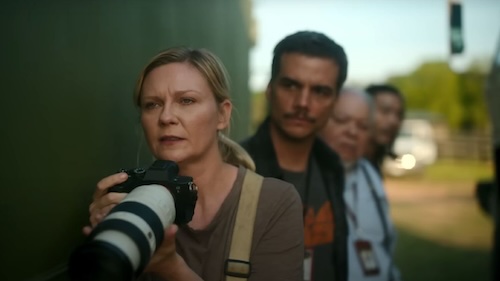
Alex Garland's new film Civil War paints a vivid and compelling portrait of human weakness. The film plays out on a grand scale against the backdrop of a violently divided America, which has been pulled apart by various secessionist movements including the newly unified front of California and Texas.
Amid this country-wide war zone, we're introduced to a group of hardy war correspondents who must travel to Washington D.C. to capture the elusive U.S. President. Garland's central conceit is typically provocative and exactly what we'd expect from the screenwriter of 28 Days Later, not to mention the director of the fabulous sci-fi thriller Ex-Machina.
With an excellent cast led by Kirsten Dunst and an accomplished filmmaker at the helm, Civil War has everything in its arsenal to make you think while it jolts you out of your seat at every turn. Yet it may not be the movie you're expecting, and here's why...
1. It avoids making sweeping political statements
With a title like Civil War and a premise involving contemporary American secessionism, you'd expect the film to be a rabble-rousing, tub-thumping onslaught. But Garland is a far more considered filmmaker than that and isn't interested in stirring the hornet's nest with empty political rhetoric designed to incite all and sundry.
Instead, the political dimension is largely contained in the background and is more contextualised in terms of the geography of this new America. We learn that Washington DC is effectively walled-off from the secessionists, Escape from New York-style, but the film stops short of lecturing an audience as to how the country got to this stage.
Instead, the film drops us into the horrific immediacy of the aftermath, enforcing the fragility of physical bodies amidst gunfire and bombings as people find themselves caught up in a quintessentially human tragedy.
2. It shows us that real heroes don't wear capes
The real focus of the film lies in its salute to war correspondents. These are individuals who regularly put their life on the line to capture the brutal and tangible realities of those caught in a warzone; in real life, the likes of Britain's Don McCullin stand as memorable representatives on the frontline of war-related photojournalism.
The film channels this tenacious spirit via its central ensemble. Kirsten Dunst plays the veteran photographer who is haunted by her experiences of capturing grisly and violent events. This is contrasted with Caile Spaeney's eager but naive up-and-coming photographer who must be schooled by Dunst's character in the harsh realities of war photography.
3. It explores the addiction that comes with dangerous situations
The film also looks at how war correspondence is a double-edged sword. Although capturing the frontline of war is a noble thing that ordinary citizens have a right to see, there's also a sense of addiction to the danger. This is frequently expressed during the events of Civil War as Dunst, Spaeney and Moura's characters continually push themselves further and further into danger to capture that elusive, perfect shot that promises to bottle the reality of this new Civil War.
4. The explosive sequences aren't just for show
Civil War isn't a film that trots out its explosive set-pieces for titillating effect and indeed the film can't be described as an action movie in the strictest sense, even though it cost $50 million (A24's most expensive film to date). It is instead a riveting, tense and unsettling parable in which every sudden gunshot resounds with palpably visceral impact and invariably yields a profound sense of tragic loss.
Prepare to strap in and grip your seat regularly for a movie where the sense of violence properly connects with the audience, particularly in the film's dynamic IMAX presentation.
5. It's not a sci-fi film but instead cuts much closer to home
Given Alex Garland's sci-fi background in the acclaimed likes of Ex-Machina and Annihilation, you may expect Civil War to occupy a similar kind of reality. But there's nothing sci-fi about the film's depiction of a contemporary American nightmare. Everything is grounded in recognisable, bullet-ridden mundanity from the buildings to the roads and the vehicles, and there's nary a humanoid robot or alien ecosystem in sight.
Civil War could be seen as a near-future film. Instead, it may be better to see it as a film that occupies a chilling parallel reality to our own divided world, and for that reason, it's a provocative, fascinating and riveting watch.
Click the link below to book your tickets for Civil War. IMAX previews take place on April 11th and the film opens nationwide on April 12th.
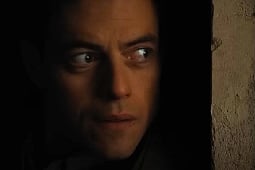
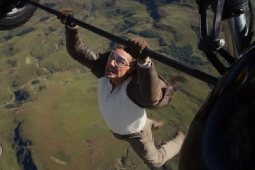
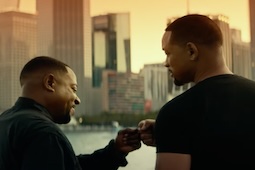
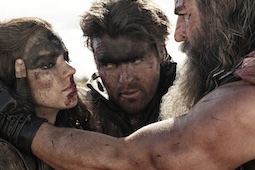

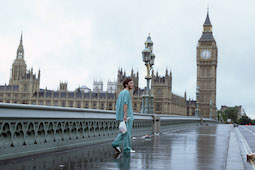


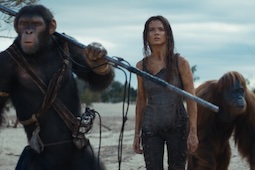
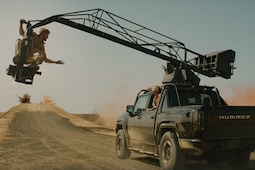




.jpg)
.png)



